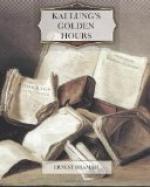At first the narration was of times legendary, when dragons and demons moved about the earth in more palpable forms than they usually maintain to-day. A great mist overspread the Empire and men’s minds were vaporous, nor was their purpose keen. Later, deities and well-disposed Forces began to exercise their powers. The mist was turned into a benevolent system of rivers and canals, and iron, rice and the silk-worm then appeared. Next, heroes and champions, whose names have been preserved, arose. They fought the giants and an era of literature and peaceful tranquillity set in. After this there was the Great Invasion from the north, but the people rallied and by means of a war lasting five years, five moons and five days the land was freed again. This prefaced the Golden Age when chess was invented, printed books first made and the Examination System begun.
So far Kiau Sun had only sung of things that men knew dimly through a web of time, but the melody of his voice and the valours of the deeds he told had held their minds. Now he began skilfully to intertwine among the narration scenes and doings that were near to all—of the coming of Spring across the mountains that surround the capital; sunrise on the great lagoon, with the splash of oars and the cormorants in flight; the appearance of the blossom in the peach orchards; the Festival of Boats and of Lanterns, their daily task, and the reward each saw beyond. Finally he spoke quite definitely of the homes awaiting their return, the mulberry-tree about the gate, the fire then burning on the hearth, the pictures on the walls, the ancestral tablets, and the voices calling each. And as he spoke and made an end of speaking the people began silently to melt away, until none remained but Kiau, Wong Pao and the Emperor and his band.
“Kiau Sun,” said the discriminating N’ang Wei, “in memory of this day the office of Chanter of Congratulatory Odes in the Palace ceremonial is conferred on you, together with the title ‘Leaf-crowned’ and the yearly allowance of five hundred taels and a jar of rice wine. And Wong Pao,” he added thoughtfully—“Wong Pao shall be permitted to endow the post—also in memory of this day.”
CHAPTER V
The Timely Intervention of the Mandarin Shan Tien’s Lucky Day
When Kai Lung at length reached the shutter, after the delay caused by Li-loe’s inopportune presence, he found that Hwa-mei was already standing there beneath the wall.
“Alas!” he exclaimed, in an access of self-reproach, “is it possible that I have failed to greet your arriving footsteps? Hear the degrading cause of my—”
“Forbear,” interrupted the maiden, with a magnanimous gesture of the hand that was not engaged in bestowing a gift of fruit. “There is a time to scatter flowers and a time to prepare the soil. To-morrow a further trial awaits you, for which we must conspire.”




